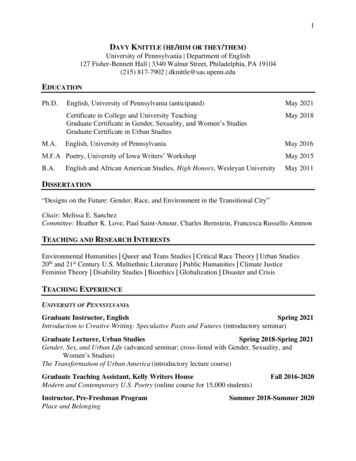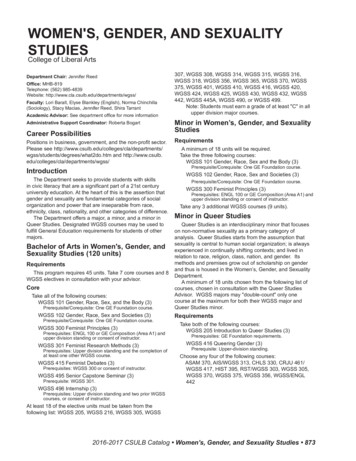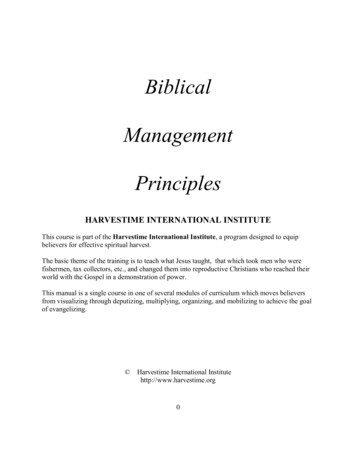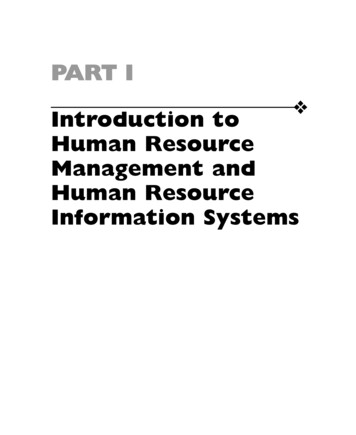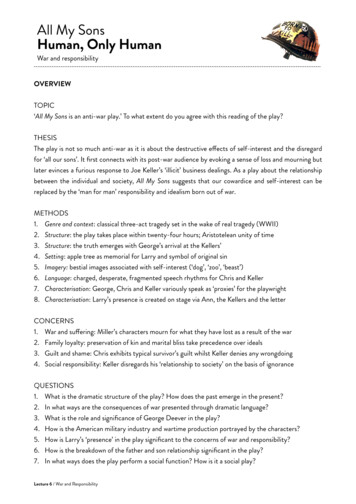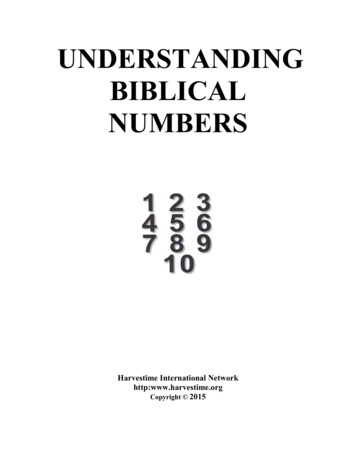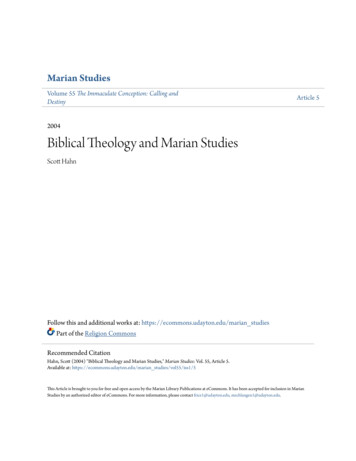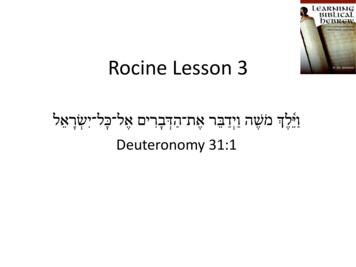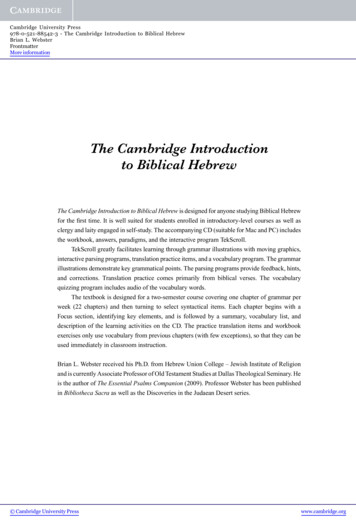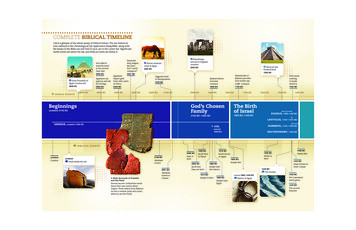
Transcription
BIBLICAL PRINCIPLES FORHUMANSEXUALITYby David Closson
OUR MISSIONThe mission of the Center for Biblical Worldview is toequip Christians with a biblical worldview and train them toadvance and defend the faith in their families, communities,and the public square.WHAT WE BELIEVEWe believe that Jesus Christ created all things and rules allthings and that He Himself is truth. We believe the Bible isGod’s inerrant, infallible, and authoritative Word and thatsubmitting our lives to it should be the goal of everyone whoseeks to follow Christ. Furthermore, we believe that the Bibleoffers the most rational and satisfying answers to life’s mostfundamental questions, including: Why are we here?What has gone wrong with our world?Is there any hope?How does it all end?We believe a person exhibits a biblical worldview when theirbeliefs and actions are aligned with the Bible, acknowledgingits truth and applicability to every area of life.biblical principles for human sexuality:survey of culture, scripture, and church historyby david closson 2020 family research councilall rights reserved.printed in the united states
BIBLICAL PRINCIPLES FORHUMAN SEXUALITY:SURVEY OF CULTURE, SCRIPTURE,AND CHURCH HISTORYby David ClossonThe rapidly changing moral landscape of the twenty-firstcentury presents a daunting challenge for Christians committedto biblical sexual ethics. In a relatively short amount of time,the moral framework undergirding Western culture has beenupended, and a revolution in morality has overturned centuries ofnorms concerning the family, marriage, and human sexuality.The comprehensive scope of this moral revolution isunprecedented. The rise of secularism and the waning influenceof Christianity in Western societies has transformed the waypeople make moral judgments. A 2018 survey revealed that onlyseven percent of Americans now hold a biblical worldview.1As a result, most people do not understand basic Christianconvictions, particularly convictions about marriage and humansexuality. Instead, they regard the Bible’s teachings about menand women, the exclusivity and permanence of marriage, andGod’s design and purpose for sex as outdated and oppressive.THE IDEAS OF THE SEXUAL REVOLUTION ARE NOWACCEPTED, CELEBRATED, AND EVEN PROMOTED INALMOST EVERY SPHERE OF SOCIETY.1
Beyond mere ignorance, the hostility against Christian sexualethics is rising and palpable. The Bible’s teachings on marriageand the sexes are challenged daily. Although same-sex marriagewas not officially sanctioned by any nation until 2001,2 theideas of the sexual revolution are now accepted, celebrated,and even promoted in the spheres of media, politics, business,entertainment, and law. Moreover, the Supreme Court’s decisionin Bostock v. Clayton County (2020) means our laws’ definitionsof biological sex are changing, too.3 As public opinion on LGBT(lesbian, gay, bisexual, transgender) issues has shifted, society istelling Christians to either abandon their convictions or leavethe public square. Christians who refuse to surrender their beliefsoften face public denunciations, censure and hostility, lawsuits,exorbitant monetary fines, loss of jobs, physical assault, and evenprison.4But secular culture is not the only challenger of Christiansexual ethics. Increasingly, theologically liberal churches anddenominations are raising objections to the church’s historicteaching on marriage. These denominations insist that theBible allows for a wide range of interpretations. As a result,Christians—and especially pastors—face mounting pressure tocompromise or at least downplay the Bible’s teaching on humansexuality.The moral revolution has raised questions and challengedlong-standing presuppositions about sexuality. How should2
Christians who are committed to God’s Word and a biblicalsexual ethic respond? What responsibility do pastors and thosecalled to shepherd the church have when it comes to thesecontested issues? What does the Bible teach about marriageand homosexuality? How can Christians practice a biblicalethic that is marked by both truth and love? This publicationwill help today’s Christians answer these questions by surveyingkey passages of Scripture that speak directly to human sexuality,as well as consulting the wisdom of pastors and theologiansthroughout church history.For many people, conversations about marriage and sexualityare not primarily theoretical or academic, but personal. They orsomeone they know have wrestled with questions about humansexuality. Unfortunately, the church has sometimes failed tominister in a spirit of love and grace to those personally affectedby the sexual brokenness that marks our fallen world. Thispublication seeks to present the Bible’s teaching on marriage andsexuality with clarity and compassion, with the understandingthat both truth and love must frame a biblically faithful responseto the moral revolution.But first, it is vital to place the moral revolution in its context,define key terms such as “sexuality,” and explain why a biblicalperspective on these issues is so crucial for Christians who desireto honor God and love their neighbors well.SETTING THE STAGE:TIMELINE OF THE MORAL REVOLUTIONModern society often criticizes conservative Christians’ allegedobsession with sexual ethics. However, secular and progressiveelites are increasingly the ones forcing the issue, insistingconservatives embrace their worldview and the full spectrumof LGBT policy positions or face social ostracizing, publicshaming, or worse. Moreover, the Overton window (i.e., therange of policies that are politically acceptable to the majority of3
people at a given time) has shifted on the public’s perception ofhomosexuality. Because of this shift, those in positions of culturaland political influence are much more willing to use the coercivepower of government to accomplish their political objectives.Such is the challenge Christians must now navigate; the zerosum approach of ideologues and activists means religiousconservatives face increasing social, political, and legal pressure tosuccumb to the new orthodoxy.The “sexual revolution” of the 1960s did not emerge in avacuum. It resulted from our culture’s shifting views of rightand wrong—a moral revolution. Thus, before addressing today’spressing issues related to sexuality, it is helpful to take a step backand consider how we arrived at where we are today. What keycultural changes created the necessary conditions for the moralrevolution and new sexual ethics to take hold?AT LEAST FOUR CULTURAL DEVELOPMENTS PAVED THEWAY FOR THE MORAL REVOLUTION: URBANIZATION,CONTRACEPTION, THE OVERTURNING OF LAWSRESTRICTING SEXUAL BEHAVIOR, AND CHRISTIANITY’SLOSS OF CULTURAL INFLUENCE.A lengthy overview of the history of the moral revolution exceedsthe scope of this publication. However, it is important to note afew of the developments that helped make the twentieth century,in the words of one commentator, “the century of the greatestchange in sexual morality in the history of Western civilization.”5This historical framework will help us navigate the moralconfusion surrounding much of the conversation about sexualethics.4
There are at least four cultural developments that paved the wayfor the moral revolution.6 First, the rise of urbanization offerednew opportunities for anonymity. In 1800, seven percent ofthe world’s population lived in cities. Today, 55 percent of theworld’s population lives in dense population centers. By 2050, itis projected that this number will rise to 68 percent.7 One of thesocial effects of the rise of dense population centers is the erosionof community-based accountability that often exists in ruraland less populated areas. In other words, the rise of cities helpedremove a societal check against premarital and extramaritalliaisons by lowering the chance of discovery and exposure.Second, advances in contraceptive technology—such as “thePill”—separated sex from potential pregnancy in the minds ofmany people. As Albert Mohler notes, “Once the Pill arrived,with all its promises of reproductive control, the biological checkon sexual immorality that had shaped human existence fromAdam and Eve forward was removed almost instantaneously.”8Whereas before the potential consequence of conceiving a childserved as a natural deterrent from premarital or extramarital sex,the Pill allowed for seemingly consequence-free sexual activity.Third, laws that restrictedcertain sexual behaviors andconduct were replaced oroverturned. For example,access to birth controlexpanded dramaticallyfollowing two SupremeCourt cases, Griswold v.Connecticut (1965) andEisenstadt v. Baird (1972).In Griswold v. Connecticut,the Court overturned astate law that preventedmarried women from accessing birth control. In Eisenstadt v.Baird, the Court extended contraceptive access to unmarriedcouples. Today, legal precedent has established a broad view of5
individual liberty regarding personal and intimate decisions.Recent evidence for this includes the Supreme Court’s decisionin 2015 to legalize same-sex marriage. Significantly, the majorityin this case based their decision on a very expansive view ofliberty, arguing the Constitution promises liberty to the extentthat people may “define and express their identity.”9 The cultureand mainstream legal philosophy have propagated a newautonomous being who alone may shape their identity and sexualbehavior.Finally, a fourth development contributing to the moralrevolution is Christianity’s loss of cultural influence. Accordingto Pew Research, in 2019, 65 percent of American adultsdescribed themselves as Christian—down 12 percentage pointssince 2009. In the same time period, the percentage of Americanswho identify with no religion has risen to 26 percent, up from 17percent in 2009. The rise in religious “nones” is most pronouncedamong the younger generations.10 These changes in America’sreligious demographics mean that fewer people understand orhold Christian convictions, including those relating to sexualmorality.6
These four factors have contributed to a cultural, political, andlegal environment hostile to Christian beliefs on the natureof marriage and human sexuality. Additional trends—such ascohabitation, absentee fathers, no-fault divorce, pornography, andabortion—have also contributed to the weakening of the familyand society’s moral malaise.Christian ethics are clearly no longer a cultural default—they arein need of a robust defense. The church has an opportunity and aresponsibility to articulate the substance behind its convictions.If the church does not teach a biblical sexual ethic, the cultureand its antibiblical ideas and practices will irreversibly underminenatural marriage and family, which constitute the foundationof civilization. The following will provide an explanation fora biblical sexual ethic, beginning with an introduction to theconcepts of sexuality and marriage from the perspective ofScripture.DEFINITION AND GENERAL FRAMEWORK FORSEXUALITY AND MARRIAGEThe term “sexuality” is frequently used without a cleardefinition.11 The prevalence of several competing interpretationsreflects a lack of consensus, even within the church. For example,one theologian states that sexuality is the “universal humancondition of being desirous for, expressive of, and receptivetoward human relationships.”12 Another argues it is “the humandrive toward intimate communion.”13 A third says, “sexualitycomprises all aspects of the human person that are related toexistence as male and female.”14Common to these expansive definitions is the idea thatsexuality is a personal and relational reality, not a physicalactivity. However, others expand the definition further, arguingthat sexuality, as an essential part of human experience andidentity, necessarily includes behavior. Many in the LGBT7
movement hold to this view and thus define themselves inlight of their sexual preferences or “sexual orientation,” aterm that encompasses sexual attractions, behaviors, and selfidentification.15For Christians, perhaps one of the difficulties with definingsexuality is that the Bible does not give a textbook definition.As Ken Magnuson explains, “[The Bible] depicts human beingsas embodied creatures who are male and female, and it speaksclearly about sexual desire and sex, but it does not explicitlytreat the concept of sexuality. As a result, it may be that ourunderstanding is strongly influenced by accounts derived fromsocial science and even popular culture.”16 Absent an easilyaccessible definition, some Christians may take their cues onsexuality from recent academic studies, marketing campaigns, orcultural norms.SEXUALITY IS THE BASIS OF THE DESIRE FOR MALEAND FEMALE TO BE UNITED IN A ONE-FLESH UNIONTHAT WE CALL MARRIAGE.While the Bible does not provide a succinct definition forsexuality, it does provide a robust framework for one. Magnusonproposes a helpful definition: “The Biblical account suggeststhat human sexuality is a central aspect of who we are as humanbeings, which produces sexual desire, drawing us towards theone-flesh union of one man and one woman in marriage.” Headds, “Sexuality is a way of describing the dynamic of malenessand femaleness, which produces a desire that moves male andfemale to be completed through an intimate bond that Genesisdescribes as a one-flesh union (Gen. 2:24).”178
In other words, sexuality is the basis of the desire for male andfemale to be united in a one-flesh union that we call marriage.Such a union is both physical and relational, exclusive, andpermanent. God intended sexual desire to draw people tomarriage, not merely to sex.18 Thus, because the marriagerelationship governs a biblical understanding of sexuality,understanding what the Bible teaches about the nature andpurposes of marriage is essential.THE BIBLE’S TEACHING ON MARRIAGEBelow, a few key passages lay out the Bible’s teaching onmarriage.Genesis 1-2A Christian theology of marriage begins in Genesi
God’s design and purpose for sex as outdated and oppressive. BIBLICAL PRINCIPLES FOR HUMAN SEXUALITY: SURVEY OF CULTURE, SCRIPTURE, AND CHURCH HISTORY by David Closson THE IDEAS OF THE SEXUAL REVOLUTION ARE NOW ACCEPTED, CELEBRATED, AND EVEN PROMOTED IN ALMOST EVERY SPHERE OF SOCIETY. 2 Beyond mere ignorance, the hostility
